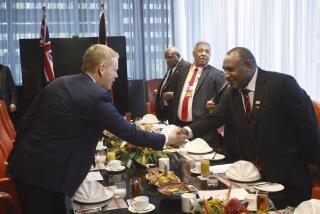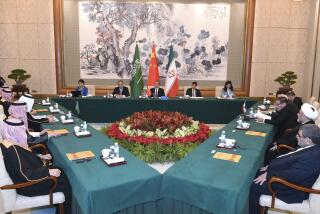NEWS ANALYSIS : Growing Western Ties Set Off Gulf Jitters : Security: Iran and some other Arab powers see U.S. pact as a step toward control of oil.
- Share via
NICOSIA, Cyprus — The Ayatollah Musavi Ardebili, an Iranian hard-liner and regular U.S.-baiter at Tehran University prayer meetings, declared Friday that had Muslims risen against Americans during the Gulf War, Washington could not have secured naval and air force operating rights in Kuwait.
For Ardebili and more moderate Iranian leaders, and for several Arab powers as well, the issue is who will control the Persian Gulf and its oil riches now that Iraq and its huge army have been taken out of the game.
Last month’s U.S.-Kuwait agreement--a 10-year pact giving the American military access to ports and airfields in Kuwait and the right to pre-position some arms there--strikes the Iranians as a first step in a full-bore Western presence in the Gulf.
The pact does not permit Washington to establish permanent bases in the emirate. But it grants easy U.S. military access to the Gulf. And opponents of a heightened Western profile along the international waterway, the passage for the majority of oil headed for world markets, saw further evidence in dealings between the Kuwait government and British and French emissaries.
At midweek, Peter de la Billiere, the commander of British forces in the Gulf War, was in Kuwait city discussing security matters, according to diplomatic reports. They said Britain might supply trainers for the Kuwait army.
Meanwhile, a state-run Kuwait newspaper quoted French Ambassador Jean Bressot as saying Paris has reached agreement, in principle, on an unspecified military arrangement with the emirate’s rulers, who were returned to power by the U.S.-led Desert Storm offensive against Iraq earlier this year.
Press reports from the Gulf indicate that neither the British nor the French expect to get as deeply involved as Washington in Kuwait’s security needs, but the developments have stirred a growing controversy. Underlining the anxiety in Iran were this week’s visits to London and Paris by the Kuwaiti emir, Sheik Jabbar al Ahmed al Sabah.
Ardebili, a former Iranian chief justice, was blunt in presenting the hard-line view of the Western presence in the Gulf. He called on Muslims to attack U.S. interests in the Middle East and elsewhere, the official Islamic Republic News Agency said in reports monitored in Nicosia.
“What has happened to your Islamic zeal?” he asked the crowd at Friday prayers. “Had the Muslims of Hijaz (Saudi Arabia) killed 10 American soldiers each day (during the war), they would not have dared to come to Kuwait now.”
The sudden surge of the Western connection means that practical decisions in a dangerous region are replacing high-flown postwar diplomatic schemes. For example, the highly touted Damascus Declaration designed to establish an Arab force for Gulf security now appears dead. The idea was for Egypt and Syria to provide the muscle and for Kuwait, Saudi Arabia and the four other Gulf Cooperation Council states to bankroll a defense force.
Damascus and Cairo needed the money, and the idea could have worked. But the Saudis and others began to openly entertain the thought that Iran, which forms one shore of the Gulf, should have some say in its security.
Egypt objected, insisting on an all-Arab force made up of countries that joined the Desert Storm coalition. But Iran sat out the war. Egypt also was reportedly unhappy about its share of reconstruction contracts in Kuwait. And Syria opposes Western military domination of the Gulf on pan-Arab grounds.
Meanwhile, the Gulf council’s attempts to boost its combined military strength have stalled. In the vacuum, Kuwait has reached out to Western powers.
Other Gulf states may follow, reports from the region say. Even before the war, the island nation of Bahrain was providing air and naval access to U.S. planes and ships. The United Arab Emirates may be next to strike a deal with Washington, some Arab commentators speculate. And the Saudis have just accepted a shipment of Patriot missiles and their U.S. crews.
What U.S. officials are calling “enhanced security arrangements” for Kuwait are the sorts of postwar commitments that could keep the United States entangled in Middle East politics for years to come. That’s the price of oil.
More to Read
Sign up for Essential California
The most important California stories and recommendations in your inbox every morning.
You may occasionally receive promotional content from the Los Angeles Times.













